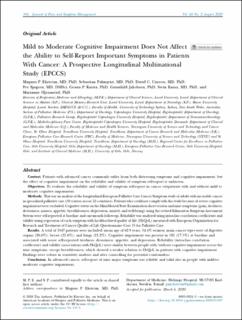| dc.contributor.author | Ekström, Magnus P. | |
| dc.contributor.author | Palmqvist, Sebastian | |
| dc.contributor.author | Currow, David C. | |
| dc.contributor.author | Sjøgren, Per | |
| dc.contributor.author | Kurita, Geana Paula | |
| dc.contributor.author | Jakobsen, Gunnhild | |
| dc.contributor.author | Kaasa, Stein | |
| dc.contributor.author | Hjermstad, Marianne Jensen | |
| dc.date.accessioned | 2021-03-05T12:59:06Z | |
| dc.date.available | 2021-03-05T12:59:06Z | |
| dc.date.created | 2020-11-27T10:59:56Z | |
| dc.date.issued | 2020 | |
| dc.identifier.citation | Journal of Pain and Symptom Management. 2020, 60 (2), 346-354.e2. | en_US |
| dc.identifier.issn | 0885-3924 | |
| dc.identifier.uri | https://hdl.handle.net/11250/2731897 | |
| dc.description.abstract | Context
Patients with advanced cancer commonly suffer from both distressing symptoms and cognitive impairment, but the effect of cognitive impairment on the reliability and validity of symptom self-report is unknown.
Objectives
To evaluate the reliability and validity of symptom self-report in cancer outpatients with and without mild to moderate cognitive impairment.
Methods
This was an analysis of the longitudinal European Palliative Care Cancer Symptom study of adults with incurable cancer in specialized palliative care (30 centers across 12 countries). Patients who could not comply with the study because of severe cognitive impairment were excluded. Cognitive status on the Mini-Mental State Examination short version and nine symptoms (pain, tiredness, drowsiness, nausea, appetite, breathlessness, depression, anxiety, and well-being) using the revised Edmonton Symptom Assessment System were self-reported at baseline and one-month follow-up. Reliability was analyzed using intraclass correlation coefficients and validity using regression of each symptom with health-related quality of life (HrQoL) measured with European Organization for Research and Treatment of Cancer Quality of Life Questionnaire Core 15 for Palliative Care.
Results
A total of 1047 patients were included: mean age of 62.9 years; 54.4% women; main cancer types were of digestive organs (26.6%), breast (21.6%), and lungs (21.2%). Cognitive impairment was present in 181 (17.3%) at baseline and associated with worse self-reported tiredness, drowsiness, appetite, and depression. Reliability (intraclass correlation coefficient) and validity (associations with HrQoL) were similar between people with/without cognitive impairment across the nine symptoms, except breathlessness, which showed a weaker relation to HrQoL in patients with cognitive impairment. Findings were robust in sensitivity analyses and after controlling for potential confounders.
Conclusion
In advanced cancer, self-report of nine major symptoms was reliable and valid also in people with mild-to-moderate cognitive impairment. | en_US |
| dc.language.iso | eng | en_US |
| dc.publisher | Elsevier | en_US |
| dc.rights | Navngivelse 4.0 Internasjonal | * |
| dc.rights.uri | http://creativecommons.org/licenses/by/4.0/deed.no | * |
| dc.title | Mild to Moderate Cognitive Impairment Does Not Affect the Ability to Self-Report Important Symptoms in Patients With Cancer: A Prospective Longitudinal Multinational Study (EPCCS) | en_US |
| dc.type | Peer reviewed | en_US |
| dc.type | Journal article | en_US |
| dc.description.version | publishedVersion | en_US |
| dc.source.pagenumber | 346-354.e2 | en_US |
| dc.source.volume | 60 | en_US |
| dc.source.journal | Journal of Pain and Symptom Management | en_US |
| dc.source.issue | 2 | en_US |
| dc.identifier.doi | 10.1016/j.jpainsymman.2020.03.007 | |
| dc.identifier.cristin | 1853301 | |
| cristin.ispublished | true | |
| cristin.fulltext | original | |
| cristin.qualitycode | 1 | |

